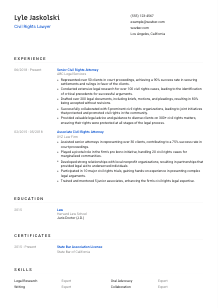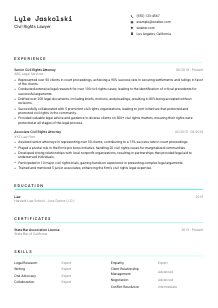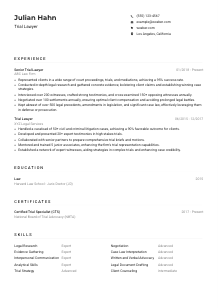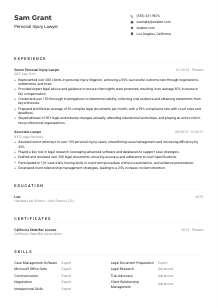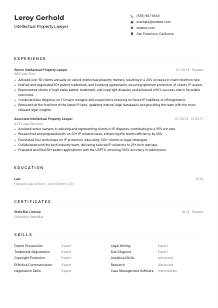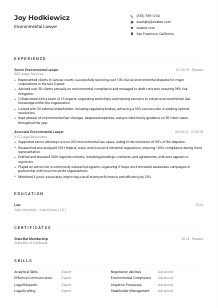Civil Rights Lawyer CV Example
Fighting for justice, but your CV feels held back? Review this Civil Rights Lawyer CV example, tuned with Wozber free CV builder. Learn how you can present your advocacy and litigation skills to match the job requirements, making sure your career journey stands tall in the fight for equality!
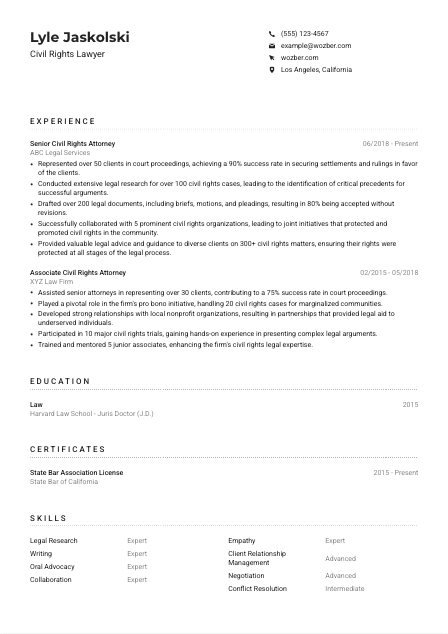
How to write a Civil Rights Lawyer CV?
Embarking on a quest to join the champions of justice as a Civil Rights Lawyer? Your CV is your sword and shield in this noble pursuit. Captivating the battleground of employment requires more than just credentials; it necessitates a CV that mirrors your dedication to civil rights and your prowess in advocacy.
Wozber's free CV builder is your trusted squire in this quest, offering an ATS-compliant CV, perfected with an ATS-friendly CV template and honed through ATS optimisation. Let's guide your steps to craft a tailored CV that resonates deeply with the specific demands of a Civil Rights Lawyer position.
Personal Details
The 'Personal Details' section is your herald in the kingdom of job applications, proudly announcing your presence. Let's ensure it radiates the essence of a Civil Rights Lawyer, distinctive and aligned with your quest.
1. Name Prominence
Your name is not just a label; it's a declaration of your professional identity. Present it boldly atop your CV using a clean, professional font. Let it be the beacon that draws attention.
2. Job Title Precision
Right beneath your name, bestow your targeted role title - "Civil Rights Lawyer". This alignment with the job you're applying for acts as a lance, piercing through the ranks of generic applications.
3. Critical Contact Information
In the medieval scroll of communication, your phone number and professional email address are paramount. A misplaced digit or a whimsical email could break the spell of professionalism. Stick to a format that champions clarity and seriousness, much like your advocacy for justice.
4. Geographical Alliances
The realm you hail from matters greatly. By specifying "Los Angeles, California" (the nexus of this job's arena), you show readiness to either defend the territory or embark upon this new quest without the need for relocation spells.
5. Fortress of Digital Presence
A LinkedIn profile or personal website showcasing your battles, victories, and alliances can be a powerful addition. Ensure it's a mirror reflection of your CV, offering a deeper insight into your crusade for civil rights.
Takeaway
Your 'Personal Details' section is more than just an introduction; it's the standard you rally behind as you march towards your next battleground. Craft it with pride, precision, and a keen eye for the strategic advantage it provides in your noble quest for justice.





Experience
The 'Experience' section is the epicenter of your CV, the detailed chronicle of your campaigns and victories. For a Civil Rights Lawyer, this is where you don the armor of advocacy, research, and client representation, showcasing your valor and strategic intellect.
- Represented over 50 clients in court proceedings, achieving a 90% success rate in securing settlements and rulings in favor of the clients.
- Conducted extensive legal research for over 100 civil rights cases, leading to the identification of critical precedents for successful arguments.
- Drafted over 200 legal documents, including briefs, motions, and pleadings, resulting in 80% being accepted without revisions.
- Successfully collaborated with 5 prominent civil rights organisations, leading to joint initiatives that protected and promoted civil rights in the community.
- Provided valuable legal advice and guidance to diverse clients on 300+ civil rights matters, ensuring their rights were protected at all stages of the legal process.
- Assisted senior attorneys in representing over 30 clients, contributing to a 75% success rate in court proceedings.
- Played a pivotal role in the firm's pro bono initiative, handling 20 civil rights cases for marginalized communities.
- Developed strong relationships with local nonprofit organisations, resulting in partnerships that provided legal aid to underserved individuals.
- Participated in 10 major civil rights trials, gaining hands‑on experience in presenting complex legal arguments.
- Trained and mentored 5 junior associates, enhancing the firm's civil rights legal expertise.
1. Dissecting the Quest Requirements
Begin your preparation by scrutinizing the job description. Highlight the demands of the position, such as "representing clients in court proceedings, including trials, hearings, and settlement negotiations." This will be your map to tailor your narrative.
2. Commanding Roles and Fortresses
List your roles in reverse-chronological order, stating your title, the name of your legal council or organisation, and the tenure of your service. This establishes a timeline of your growth and the realms you've protected.
3. Valor in Contributions
For each position held, weave a narrative of your accomplishments that resonate with the job description. Phrases like "Represented over 50 clients in court proceedings, achieving a 90% success rate" are the banners of your success that will catch the eye of those in need of your advocacy.
4. The Might of Numbers
Quantify your achievements whenever possible. Numbers are the universal language that speak of your impact and prowess. A claim like "Drafted over 200 legal documents, resulting in 80% being accepted without revisions" demonstrates your skill with the written word and strategic litigation.
5. The Essence of Relevance
Charge forward with relevant experiences that echo the responsibilities and virtues sought by your future allies. Extraneous tales, while interesting, may dilute the potency of your specialized crusade for civil rights.
Takeaway
With every entry in your 'Experience' section, you're laying siege to any doubt of your qualifications. This isn't just a list; it's a testament to your commitment, expertise, and victories in the realm of civil rights. Leverage it to leave an indelible mark on the hiring council.
Education
In the illustrious journey of a Civil Rights Lawyer, education forms the bedrock of your expertise. Here, we lay out your academic conquests and the scholarly realms you've traversed, showcasing the rigor and dedication that have prepared you for battle.
1. The Charter of Learning
Isolate the core academic requisites from the job description, such as the "Juris Doctor (J.D.) degree from an accredited law school." This forms the cornerstone of your education section, affirming your qualification to enter the judicial joust.
2. The Edifice of Academia
Build this section with clarity and brevity. Align your institution, degree, field of study, and year of conquest in a straightforward manner, creating an easily navigable chronicle of your academic journey.
3. Honoring Your Degree
In instances where your scholastic achievements directly mirror the job requirements, such as the debated J.D. degree, herald these credentials. Your path of study is a testament to your dedication to the mantle of Civil Rights Lawyer.
4. The Tome of Relevance
Should your journey through academia include chapters highly relevant to the practice of civil rights law, such as specific courses or seminars, mention these. It provides a deeper look at your preparation for this specific arena of law.
5. Banners of Distinction
Highlighting honors, societies, and other academic accolades can serve as proof of your dedication and prowess. Be mindful of the role's level, focusing on distinctions that reinforce your suitability for the position.
Takeaway
Your education section isn't just a list; it's the foundation upon which your legal career is built. It underscores your commitment to civil rights and equips you with the knowledge to wage your noble legal battles. Sculpt it with the gravitas it deserves.
Certificates
Certificates are more than just scrolls; they are seals of your ongoing mastery and commitment to your craft. For a Civil Rights Lawyer, they underscore your specialty in the realm and your pledge to never cease sharpening your sword of justice.
1. Unearthing the Scrolls
In the quest for civil rights, specific certifications may not always be called for, but they can be the blade that sets you apart. Begin by reviewing if the job description calls for any such scrolls of expertise.
2. Selective Display of Arms
When listing your certifications, the banner of quality trumps quantity. Choose those that directly enhance your standing as a Civil Rights Lawyer, like a certification in constitutional law or human rights legislation, showing a focused path of expertise.
3. The Chronology of Achievement
For certificates with a timeline or recent acquisitions, including the dates not only shows your current standing but also your journey of continuous growth and reaffirmation of your dedication to civil rights law.
4. The Forge of Competence
The legal world, like all realms of justice, is ever-evolving. Regularly update your certifications and continue seeking knowledge. This commitment to growth speaks volumes of your dedication to justice and equity.
Takeaway
This section is a testament to your pursuit of excellence and a beacon for your unwavering commitment to civil rights law. Through these certifications, you demonstrate not just your past victories but your readiness for future battles.
Skills
The 'Skills' section is your armory, housing the tools of your trade. In the quest to become a Civil Rights Lawyer, it showcases your weaponry - the hard and soft skills that make you formidable in court and compassionate with clients.
1. Deciphering the Battlefield
Lay out the battleground by extracting both explicit and implicit skills required for a Civil Rights Lawyer from the job description. Skills like "oral advocacy" and "legal research" are your swords and shields in this field.
2. Sharpening Your Weapons
Match your skills with those listed in the job announcement, focusing on those that make you a unique warrior in the fight for justice. Highlight your expertise in areas like "client relationship management" and "negotiation," showcasing your balanced approach between compassionate advocacy and tactical negotiation.
3. Aligning Your Arsenal
In the labyrinth of skills, it's tempting to list every weapon in your armory. However, focus on the most pertinent skills that mark you as an unparalleled champion of civil rights, making it impossible for hiring managers to overlook your prowess.
Takeaway
Your 'Skills' section is a testament to your readiness for battle. Each skill you possess is a piece of armor making you invulnerable and equipped for the challenges ahead. Polish them with pride, and prepare to wield them in your fight for justice.
Languages
In a world divided by barriers, the ability to communicate across them is as powerful as a diplomat's treaty. For a Civil Rights Lawyer, fluency in multiple languages can be the bridge that connects diverse communities and amplifies their voices in the quest for justice.
1. Scouting the Terrain
Begin by identifying any language requirements or preferences from the job description, such as the mandatory "fluent and articulate English communication." This is the common tongue in your pursuit of justice.
2. Linguistic Diplomacy
If the job specifies a language, highlight it at the top of your 'Languages' section, indicating your proficiency level. This assures your capability to negotiate the vast landscapes of civil rights law with ease and clarity.
3. Unveiling Your Polyglot Banner
Even if not specified, additional languages you command are valuable assets, displaying your versatility and capability to engage with a wider audience, strengthening your advocacy in the universal battle for rights.
4. The Realm of Understanding
Be forthright about your linguistic prowess, using clear indicators of your mastery level. Whether 'Native', 'Fluent', 'Intermediate', or 'Basic', each is a testament to your capacity for engagement on multiple fronts.
5. Global Advocacy
For a Civil Rights Lawyer, the impact of your advocacy can resonate beyond local confines. By including multiple languages, you underscore your readiness for global engagement, making you a versatile champion of civil rights.
Takeaway
Embrace your linguistic capabilities as more than just credentials on your CV. They are the embodiment of your potential to connect, understand, and champion the cause of justice across cultures and borders. Flaunt them with pride, recognizing them as tools of unity in your advocacy.
Summary
The 'Summary' section is the banner under which you rally your application. It must capture the essence of your professional identity as a Civil Rights Lawyer, summarizing your skills, experiences, and ambitions in a manner that resonates with the voice of justice.
1. The Essence of Your Quest
Dive deep into the job description, identifying the core qualities sought by your potential allies. This understanding forms the foundation of your summary, shaping it to reflect the essence of a Civil Rights Lawyer.
2. Proclaiming Your Identity
Begin with a powerful introduction, positioning yourself confidently as a Civil Rights Lawyer dedicated to the protection of civil liberties and the fight for justice.
3. Unfurling Your Achievements
Highlight your significant victories and skills that align with the job requirements. Phrases like "Known for a high success rate in settlements and rulings" draw a vivid picture of your capabilities and impact.
4. A Banner of Brevity
While your accomplishments are vast, your summary should be a concise banner that invites engagement. Craft 3-5 lines that encapsulate your essence, leaving a trail for the curious to follow deeper into your CV.
Takeaway
Your summary is the clarion call that gathers attention and intrigue towards your application. It's the prelude to your professional saga that excites and invites further exploration. With it, herald your approach with confidence, knowing it precisely reflects the champion of civil rights you are.
Drawing Your CV Battle Plans
As we conclude this guided journey towards crafting your Civil Rights Lawyer CV, remember, each section is a strategic formation on the battlefield of employment. Using Wozber's free CV builder, including a free ATS-friendly CV template, perfect your CV to become an indomitable force. ATS optimisation and our ATS CV scanner ensure your CV not only meets the eye of the hiring manager but also speaks directly to the heart of the battle for civil rights. Marshal your credentials, skillfully wield your experiences, and proudly display your certifications.
The journey to your next great role in the legal arena awaits. Forward, to justice!

- Juris Doctor (J.D.) degree from an accredited law school.
- Admission to and in good standing with the State Bar Association in the targeted region.
- Minimum of 5 years of experience specifically practicing civil rights law.
- Strong research, writing, and oral advocacy skills.
- Demonstrated ability to work effectively with diverse clients and communities.
- Fluent and articulate English communication skills are essential.
- Must be located in or willing to relocate to Los Angeles, California.
- Investigate and assess potential civil rights violations.
- Represent clients in court proceedings, including trials, hearings, and settlement negotiations.
- Conduct legal research and draft legal documents, such as briefs, motions, and pleadings.
- Collaborate with legal and non-legal organizations to promote and protect civil rights.
- Provide legal advice and guidance to clients on civil rights matters.





